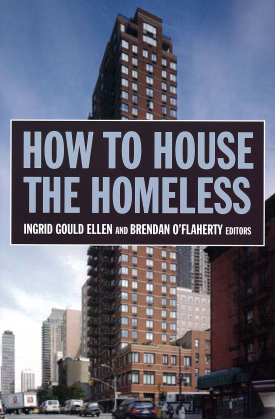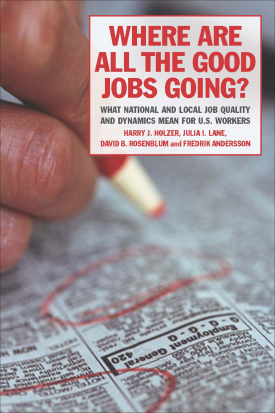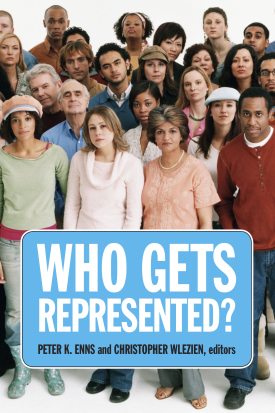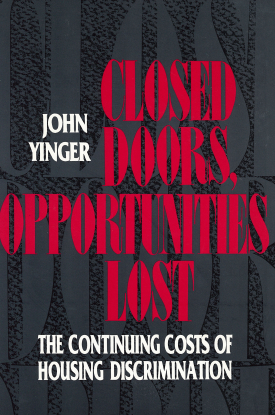
How to House the Homeless
About This Book
How to House the Homeless, editors Ingrid Gould Ellen and Brendan O’Flaherty propose that the answers entail rethinking how housing markets operate and developing more efficient interventions in existing service programs. The book critically reassesses where we are now, analyzes the most promising policies and programs going forward, and offers a new agenda for future research.
How to House the Homeless makes clear the inextricable link between homelessness and housing policy. Contributor Jill Khadduri reviews the current residential services system and housing subsidy programs. For the chronically homeless, she argues, a combination of assisted housing approaches can reach the greatest number of people and, specifically, an expanded Housing Choice Voucher system structured by location, income, and housing type can more efficiently reach people at-risk of becoming homeless and reduce time spent homeless. Robert Rosenheck examines the options available to homeless people with mental health problems and reviews the cost-effectiveness of five service models: system integration, supported housing, clinical case management, benefits outreach, and supported employment. He finds that only programs that subsidize housing make a noticeable dent in homelessness, and that no one program shows significant benefits in multiple domains of life.
Contributor Sam Tsemberis assesses the development and cost-effectiveness of the Housing First program, which serves mentally ill homeless people in more than four hundred cities. He asserts that the program’s high housing retention rate and general effectiveness make it a viable candidate for replication across the country. Steven Raphael makes the case for a strong link between homelessness and local housing market regulations—which affect housing affordability—and shows that the problem is more prevalent in markets with stricter zoning laws. Finally, Brendan O’Flaherty bridges the theoretical gap between the worlds of public health and housing research, evaluating the pros and cons of subsidized housing programs and the economics at work in the rental housing market and home ownership. Ultimately, he suggests, the most viable strategies will serve as safety nets—“social insurance”—to reach people who are homeless now and to prevent homelessness in the future.
It is crucial that the links between effective policy and the whole cycle of homelessness—life conditions, service systems, and housing markets—be made clear now. With a keen eye on the big picture of housing policy, How to House the Homeless shows what works and what doesn’t in reducing the numbers of homeless and reaching those most at risk.
INGRID GOULD ELLEN is professor of public policy and urban planning at the New York University Robert F. Wagner Graduate School of Public Service.
BRENDAN O’FLAHERTY is professor of economics at Columbia University.
CONTRIBUTORS: Ingrid Gould Ellen, Jill Khadduri, Brendan O’Flaherty, Edgar O. Olsen, Stephen Raphael, Robert Rosenheck, Sam Tsemberis
Related Events & Media
RSF Journal
View Book Series
Sign Up For Our Mailing List
Apply For Funding

Where Are All the Good Jobs Going?
About This Book
Deindustrialization in the United States has triggered record-setting joblessness in manufacturing centers from Detroit to Baltimore. At the same time, global competition and technological change have actually stimulated both new businesses and new jobs. The jury is still out, however, on how many of these positions represent a significant source of long-term job quality and security. Where Are All the Good Jobs Going? addresses the most pressing questions for today’s workers: whether the U.S. labor market can still produce jobs with good pay and benefits for the majority of workers and whether these jobs can remain stable over time.
What constitutes a “good” job, who gets them, and are they becoming more or less secure? Where Are All the Good Jobs Going? examines U.S. job quality and volatility from the perspectives of both workers and employers. The authors analyze the Longitudinal Employer Household Dynamics (LEHD) data compiled by the U.S. Census Bureau, and the book covers data for twelve states during twelve years, 1992–2003, resulting in an unprecedented examination of workers and firms in several industries over time.
Counter to conventional wisdom, the authors find that good jobs are not disappearing, but their character and location have changed. The market produces fewer good jobs in manufacturing and more in professional services and finance. Not surprisingly, the best jobs with the highest pay still go to the most educated workers. The most vulnerable workers—older, low-income, and low-skilled—work in the most insecure environments where they can be easily downsized or displaced by a fickle labor market. A higher federal minimum wage and increased unionization can contribute to the creation of well paying jobs. So can economic strategies that help smaller metropolitan areas support new businesses. These efforts, however, must function in tandem with policies that prepare workers for available positions, such as improving general educational attainment and providing career education.
Where Are All the Good Jobs Going? makes clear that future policies will need to address not only how to produce good jobs but how to produce good workers. This cohesive study takes the necessary first steps with a sensible approach to the needs of workers and the firms that hire them.
HARRY J. HOLZER is professor of public policy at Georgetown University.
JULIA I. LANE is program director of Science of Science and Innovation Policy at the National Science Foundation, research fellow at the Institute of Labor (IZA), Bonn Germany, and former senior research fellow at the U.S. Bureau of the Census.
DAVID B. ROSENBLUM is senior economic analyst at NORC at the University of Chicago.
FREDRIK ANDERSSON is an economist in the Economics Department of the Office of the Comptroller of the Currency, U.S. Department of the Treasury.
RSF Journal
View Book Series
Sign Up For Our Mailing List
Apply For Funding

Who Gets Represented?
About This Book
An investigation of policy preferences in the U.S. and how group opinion affects political representation.
While it is often assumed that policymakers favor the interests of some citizens at the expense of others, it is not always evident when and how groups’ interests differ or what it means when they do. Who Gets Represented? challenges the usual assumption that the preferences of any one group—women, African Americans, or the middle class—are incompatible with the preferences of other groups. The book analyzes differences across income, education, racial, and partisan groups and investigates whether and how differences in group opinion matter with regard to political representation.
Part I examines opinions among social and racial groups. Relying on an innovative matching technique, contributors Marisa Abrajano and Keith Poole link respondents in different surveys to show that racial and ethnic groups do not, as previously thought, predictably embrace similar attitudes about social welfare. Katherine Cramer Walsh finds that, although preferences on health care policy and government intervention are often surprisingly similar across class lines, different income groups can maintain the same policy preferences for different reasons. Part II turns to how group interests translate into policy outcomes, with a focus on differences in representation between income groups. James Druckman and Lawrence Jacobs analyze Ronald Reagan’s response to private polling data during his presidency and show how different electorally significant groups—Republicans, the wealthy, religious conservatives—wielded disproportionate influence on Reagan’s policy positions. Christopher Wlezien and Stuart Soroka show that politicians’ responsiveness to the preferences of constituents within different income groups can be surprisingly even-handed. Analyzing data from 1876 to the present, Wesley Hussey and John Zaller focus on the important role of political parties, vis-à-vis constituents’ preferences, for legislators’ behavior.
Who Gets Represented? upends several long-held assumptions, among them the growing conventional wisdom that income plays in American politics and the assumption that certain groups will always—or will never—have common interests. Similarities among group opinions are as significant as differences for understanding political representation. Who Gets Represented? offers important and surprising answers
to the question it raises.
PETER K. ENNS is assistant professor of government at Cornell University.
CHRISTOPHER WLEZIEN is professor of political science at Temple University.
CONTRIBUTORS: Marisa Abrajano, Yosef Bhatti, James N. Druckman, Christopher Ellis, Robert S. Erikson, Martin Gilens, David A. Hopkins, Wesley Hussey, Lawrence R. Jacobs, Keith T. Poole, Elizabeth Rigby, Stuart N. Soroka, James A. Stimson, Laura Stoker, Joseph Daniel Ura, Katherine Cramer Walsh, Gerald C. Wright, John Zaller.
Related Events & Media
RSF Journal
View Book Series
Sign Up For Our Mailing List
Apply For Funding

Social Contracts Under Stress
About This Book
The years following World War II saw a huge expansion of the middle classes in the world's industrialized nations, with a significant part of the working class becoming absorbed into the middle class. Although never explicitly formalized, it was as though a new social contract called for government, business, and labor to work together to ensure greater political freedom and more broadly shared economic prosperity. For the most part, they succeeded. In Social Contracts Under Stress, eighteen experts from seven countries examine this historic transformation and look ahead to assess how the middle class might fare in the face of slowing economic growth and increasing globalization.
The first section of the book focuses on the differing experiences of Germany, Britain, France, the United States, and Japan as they became middle-class societies. The British working classes, for example, were slowest to consider themselves middle class, while in Japan by the 1960s, most workers had abandoned working-class identity. The French remain more fragmented among various middle classes and resist one homogenous entity. Part II presents compelling evidence that the rise of a huge middle class was far from inclusive or free of social friction. Some contributors discuss how the social contract reinforced long-standing prejudices toward minorities and women. In the United States, Ira Katznelson writes, Southern politicians used measures that should have promoted equality, such as the GI bill, to exclude blacks from full access to opportunity. In her review of gender and family models, Chiara Saraceno finds that Mediterranean countries have mobilized the power of the state to maintain a division of labor between men and women. The final section examines what effect globalization might have on the middle class. Leonard Schoppa's careful analysis of the relevant data shows how globalization has pushed "less skilled workers down and more skilled workers up out of a middle class that had for a few decades been home to both." Although Europe has resisted the rise of inequality more effectively than the United States or Japan, several contributors wonder how long that resistance can last.
Social Contracts Under Stress argues convincingly that keeping the middle class open and inclusive in the face of current economic pressures will require a collective will extending across countries. This book provides an invaluable guide for assessing the issues that must be considered in such an effort.
OLIVIER ZUNZ is Commonwealth Professor of History, University of Virginia.
LEONARD SCHOPPA is associate professor in the Woodrow Wilson Department of Government and Foreign Affairs, University of Virginia.
NOBUHIRO HIWATARI is professor of political science at the University of Tokyo.
Download
RSF Journal
View Book Series
Sign Up For Our Mailing List
Apply For Funding

Trusteeship and the Management of Foundations
About This Book
Offers two extended essays by two eminent social scientists on trusteeship and foundation management. The first essay, by Dr. Moore, reflects the author's long interest in the relations between the economy and the society. He examines trusteeship as a combination and interrelation of three main principles: custodial relations, lay control, and the law of trusts. Dr. Young's essay, the longer and more pragmatic of the two, applies these principles to the actual management of philanthropic foundations. Dr. Young draws upon his experience as a president of two social science foundations in his discussion of both the old and new "proprietary" foundations.
DONALD R. YOUNG is at Rockefeller University.
WILBERT E. MOORE is at the Russell Sage Foundation.
Download
RSF Journal
View Book Series
Sign Up For Our Mailing List
Apply For Funding

Closed Doors, Opportunities Lost
About This Book
"Yinger writes as if four decades of protest and progressive legislation have barely altered the terrain upon which minority Americans struggle for equality. He's right....Yinger figures that housing discrimination costs black homebuyers $5.7 billion and Hispanic homebuyers $3.4 billion every three years." —Washington Monthly
Nearly three decades after the passage of the Fair Housing Act, illegal housing discrimination against blacks and Hispanics remains rampant in the United States. Closed Doors, Opportunities Lost reports on a landmark nationwide investigation of real estate brokers, comparing their treatment of equally qualified white, black, and Hispanic customers. The study reveals pervasive discrimination. Real estate brokers showed 25 percent fewer homes to the minority buyers, and loan agencies were 60 percent more likely to turn down minority applicants. Realtors and lenders also charged higher prices to minority buyers, withheld or gave insufficient financial and application information, and showed them homes only in non-white neighborhoods. Residents of minority neighborhoods faced further difficulties trying to sell their homes or obtain housing credit and homeowner's insurance.
Economist John Yinger provides a lucid account of these disturbing facts and shows how deeply housing discrimination can affect the living conditions, education, and employment of black and Hispanic Americans. Deprived of residential mobility and discouraged from owning their own homes, many minority families are unable to flee stagnant or unsafe neighborhoods. Two thirds of black and Hispanic children are concentrated in high-poverty schools where educational achievement is low and dropout rates are high. The employment possibilities for minority job-seekers are diminished by the ongoing movement of jobs from the cities to the suburbs, where housing discrimination is particularly severe. Altogether, these effects of housing discrimination create a vicious cycle—discrimination imposes social and economic barriers upon blacks and Hispanics, and the resulting hardships fuel the prejudice that leads whites to associate minorities with neighborhood deterioration.
Closed Doors, Opportunities Lost provides a history of fair housing and fair lending enforcement and joins the intense debate about integration policy. Yinger proposes a bold, comprehensive program that aims not only to end discrimination in housing and mortgage markets but to reverse their long-term effects by stabilizing poorer neighborhoods and removing the stigma of integration. He urges reforms to strengthen the enforcement powers of HUD and other agencies, provide funding for poor and integrated schools, encourage local housing and race-counseling programs, and shift income tax breaks toward low-income homebuyers.
Closed Doors, Opportunities Lost provides valuable insight into the causes, extent, and consequences of housing discrimination—undeniably one of America's most vexing and important problems. This volume speaks directly to the ongoing debate about the nature and causes of poverty and the underclass, civil rights policy, the Community Reinvestment Act, and the plight of our nation's cities.
JOHN YINGER is professor of economics and public administration, and director for the Metropolitan Studies Program at the Center for Policy Research, the Maxwell School, Syracuse University.
Download
RSF Journal
View Book Series
Sign Up For Our Mailing List
Apply For Funding

Out of Wedlock
About This Book
Today, one third of all American babies are born to unmarried mothers—a startling statistic that has prompted national concern about the consequences for women, children, and society. Indeed, the debate about welfare and the overhaul of the federal welfare program for single mothers was partially motivated by the desire to reduce out of wedlock births. Although the proportion of births to unwed mothers has stopped climbing for the first time since the 1960s, it has not decreased, and recent trends are too complex to attribute solely to policy interventions. What are these trends and how do they differ across groups? Are they peculiar to the United States, or rooted in more widespread social forces? Do children of unmarried mothers face greater life challenges, and if so what can be done to help them? Out of Wedlock investigates these questions, marshalling sociologists, demographers, and economists to review the state of current research and to provide both empirical information and critical analyses.
Out of Wedlock employs a wealth of data, including the age, race, education, and other life circumstances of unwed mothers, and draws telling comparisons with other industrialized nations. Other nations have also experienced sharp increases in nonmarital fertility, but their births largely occur among cohabiting couples. Unwed mothers in the United States tend to be younger, less educated, from minority backgrounds, and to be living separately from their child's father. These trends may help explain the high rate of childhood poverty in this country. Out of Wedlock also examines such issues as the role of child support in providing income to children born outside of marriage, as well as the social and emotional outcomes for children of unwed mothers from infancy through early adulthood.
The conflicting data on nonmarital fertility give rise to a host of vexing theoretical, methodological, and empirical issues, some of which researchers are only beginning to address. Out of Wedlock breaks important new ground, bringing clarity to the data and examining policies that may benefit these particularly vulnerable children.
LAWRENCE L. WU is professor of sociology at the University of Wisconsin, Madison.
BARBARA WOLFE is professor of economics, public affairs, and preventive medicine at the University of Wisconsin, Madison.
CONTRIBUTORS:
Judi Bartfeld, Larry Bumpass, Andrew Cherlin, John Ermisch, Deborah DeGrafe, Michael Foster, Irwin Garfinkel, Robert Haveman, Saul Hoffman, Theodore Joyce, Robert Kaestner, Kelleen Kaye, Kathleen Kiernan, Sanders Korenman, Daniel Lichter, Lee Lillard, Shelley Lundberg, Sara McLanahan, Daniel Meyer, Robert Moffitt, Kelly Musick, Constantijn Panis, Karen Pence, Nancy Reichman, Julien Teitler, Dawn Upchurch, Barbara Wolfe, Lawrence Wu
Download
RSF Journal
View Book Series
Sign Up For Our Mailing List
Apply For Funding
Pagination
- Previous page
- Page 80
- Next page
